MOVIES
Itálie, Írán, 2017, 61 min
C. Insom, G. Squillacciotti
04.03.2020 20:30
Archipelago is a journey through ancient myths, exorcism rituals, sounds and spirits. In the south of Iran, on a group of islands of the Persian Gulf, humans and spirits coexist since centuries. The culture and traditions of these Islands are the result of the encounters between the African Diaspora, the Arab Countries and Iran, generating a unique system of syncretic beliefs. Spirits of different heritages and origins, called Bād, the Persian word for wind, moving through the air, take possession of the islanders bodies and can only be quieted through a music ceremony called the Zār Ritual. Thanks to an unprecedented access given to foreign film makers, the Film showcases stories and landscape s of the islanders daily life within the frame of the Rituals, giving, through pounding drum rhythms and wailing vocal chorus, a rare and unexpected glimpse of the Islamic Republic of Iran.
Camilla Insom, anthropologist lives and works Sulaimaniyah, Iraqi Kurdistan. After completing the MA in Cultural Anthropology at the University of Rome Sapienza, she's currently a Phd candidate in Iranian Studies at University of Naples "L'Orientale".She is in charge of the Anthropological Studies of "Sapienza" University of Rome. Giulio Squillacciotti is Artist, Filmmaker and researcher lives and works in Milan and Maastricht. He studied Medieval Art History in Barcelona and Rome. He owns a MA in Visual Arts from the University of Architecture in Venice IUAV, where he studied Art, Philosophy, Semiotics and Anthropology. His work is mainly oriented on storytelling, cultural apexes and the way traditions re- shape in new contexts.
Direction, production, script, edit: Camilla Insom, Giulio Squillacciotti
Camera: Giulio Squillacciotti
Language of dialogues: Persian
Langiage of subtitles: English, Czech
35th Torino Film Festival - in Competition (December 2017); 27th International Festival of Ethnological Film Belgrade
Trailer: https://vimeo.com/234164343
Kolumbie, 2013, 22 min
Simon Raising
03.03.2020 14:00
Can rap be a way out of the prison?
Hip Hop is often associated with drugs and violence and therefore seen by many as a way into prison, but Alma Negra, DJ Roky and New York, three inmates at Distrial prison in Bogota, Colombia, demonstrate the opposite. For two hours a day they are allowed to leave the courtyard to write and practice their music. Rap enables them to protest and share their experiences in life. This film tells their story and the impact Hip Hop has on them.
Simon is an ethnographic researcher and filmmaker from Utrecht, Netherlands. He attained an MA in Visual Anthropology from the Granada Centre, University of Mancester and BA in Cultural Anthropology from teh University of Utrecht. During his MA degree he has made two documentary. The latter was an ethnographic film project carried out over the summer and autumn in Bogota, Colombia.
dialogues: Spanish, subtitles: English, Czech
Production, director, camera: Simon Rasing
Alžírsko, Švýcarsko, 2018, 25 min
Pavel Borecký
03.03.2020 17:30
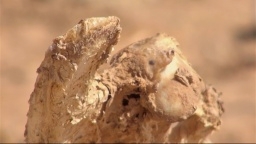 The film situates the viewer within the makeshift space of an animal market in Algeria. Drifting between feeding and waiting, one attunes to the bodies of goats and camels, the oldest companions of Arab men. As we move deeper into the desert, the site turns into a sacrifice zone and reveals its dark geopolitical secrets. The sensory ethnography film will invite you to question the banality of displacement, confinement and exploitation in an out-of-sight territory.
The film situates the viewer within the makeshift space of an animal market in Algeria. Drifting between feeding and waiting, one attunes to the bodies of goats and camels, the oldest companions of Arab men. As we move deeper into the desert, the site turns into a sacrifice zone and reveals its dark geopolitical secrets. The sensory ethnography film will invite you to question the banality of displacement, confinement and exploitation in an out-of-sight territory.
Pavel Borecký is a social anthropologist, non-fiction filmmaker and social innovator. He co-founded an award-winning research organization "Anthropictures", carried out diverse projects in Serbia, Peru, Estonia and Czech Republic, and produced several ethnographic films. Being based at University of Bern, he currently investigates tactics of managing water scarcity in Jordan and works on a new film, book and sound installation.
Director, camera, edit: Pavel Borecký
Production: Institut of Social Anthropology, University of Bern
Script: Pavel Borecký, Franziska Voigt
Language of dialogues: Arabic
Language of subtitles: English, Czech
Trailer: https://vimeo.com/282462351
Polsko, 2011, 45 min
M. Eichelberger, L. Kaminski
04.03.2020 17:00
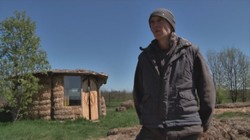 The filmmakers follow various alternative forms of socail thought, based on cooperation, openness and direct exchange of experience. They encounter on the various initiatives that seek to restore the dynamic exchange of people and culture. Dialoque with representatives and activists such as: open source trends, Permaculture, Qi gong, „Art exchange“, „Food not bombs“, presents a new from of „gift“ meaning.
The filmmakers follow various alternative forms of socail thought, based on cooperation, openness and direct exchange of experience. They encounter on the various initiatives that seek to restore the dynamic exchange of people and culture. Dialoque with representatives and activists such as: open source trends, Permaculture, Qi gong, „Art exchange“, „Food not bombs“, presents a new from of „gift“ meaning.
Maciej Eichelberger: Graduated from the academy of film and television in Warsaw, has studied anthropology at Warsaw University, author of the documentary and reports, permaculture activist.
Lukasz Kaminski: student of anthropology at Warsaw University, author of documentary film. He travels and writes.
Directiors and production: Maciej Eichelberger, Lukasz Kaminski
Language of dialogues: Polish, English
Language of subtitles: English, Polish, Czech
Lauching of movie:
"Eyes and Lenses" - 8th Ethnografic Film Review, Warsaw, 2011
Česká republika, 2014, 63 min
L.Šavelková, T.Petráň, M.Durňak
03.03.2020 20:00
The film is about the lacrosse, and its importance for the Haudenosaunee people (represented by the Iroquois Nationals), and for the Czech people (represented by the lacrosse organisations, scouts, and woodcrafters). In 2011, the World Indoor Lacrosse Championship was held in Prague, the Czech Republic. It was the first time when the Iroquois National lacrosse men’s team visited the Czech Republic, using their Haudenosaunee passports.
However, the film is not focused only on reporting of the Championship agenda. Furthermore, it highlights the essential spiritual, political and sport aspects of the lacrosse for the Haudenosaunne and Czech communities. It also explains the formation of this originally Native American game in the Central Europe, including the hint of political issues in the formercommunist Czechoslovakia.
Directors: L.Šavelková, T. Petráň, M. Durňak
Production Cinepoint
Camera: T.Petráň, M.Durňak, V. Barák, P.Řezáč, P. Záruba
Script: L.Šavelková
Edit: T.Petráň, M.Durňak
Language of dialogues: Czech, English
Langue of subtitles: Czech, English
Česká republika, 2019, 58 min
Adi Hasanbašić
03.03.2020 10:00
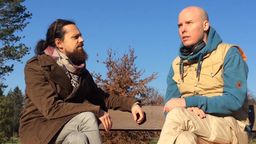 Režie, kamera, scénář, střih: Adi Hasanbašić
Režie, kamera, scénář, střih: Adi Hasanbašić
Produkce: Katedra sociální a kulturní antropologie UPa
Česká republika, 2017, 32 min
M. Pavlásek, I. Bystřičan
03.03.2020 16:30
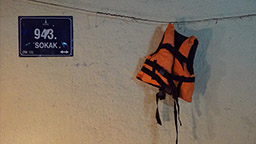 The mass is a distillation of human evolution, a parable about the treatment of substance, an image of the control over bodies that are hanged on the world’s tissue, or else disgorged from the ocean mass onto dry land, which is interwoven with bodies and the movement of hunters, gatherers, and vagabonds. Our observation of the various forms of abstracted masses, which we become part of at the same time, creates a platform of eternal presence – an active void if you will, which revolves in a closed circle, as though it had neither beginning nor end. What is left is just the stark presence of the traces of bared lives.
The mass is a distillation of human evolution, a parable about the treatment of substance, an image of the control over bodies that are hanged on the world’s tissue, or else disgorged from the ocean mass onto dry land, which is interwoven with bodies and the movement of hunters, gatherers, and vagabonds. Our observation of the various forms of abstracted masses, which we become part of at the same time, creates a platform of eternal presence – an active void if you will, which revolves in a closed circle, as though it had neither beginning nor end. What is left is just the stark presence of the traces of bared lives.
Michal Pavlásek is social anthropologist, university teacher, freelance journalist and documentarist, Turkish coffee lover, researcher at the Institute of Ethnology of the Czech Academy of Sciences, Co-founder of Anthropictures - flexible association of social scientists providing independent field research. In his research focuses on migration and multuculturalism. He is author of movies Searching for the Exit (2016), Another Vojvodovo: thinking in pictures (2013), Time Bows Beneath the Burden of the Grapes. The Past, Czechs and Germans in the Serbian Banat (2012).
Ivo Bystřičan is documentary filmmaker, story-editor and screenwriter. He directed several feature documentary films like Copper Age (2010), My Last 150 000 Cigarettes (2013), Byeway (2014), Mr. Chytil´s Crime (2014), Middle Dusk (2015) and many others. He graduated from sociology at Masaryk University in Brno and documentary filmmaking at FAMU in Prague.
Director, Production, Script: M. Pavlásek, I. Bystřičan
Camera, Edit: I.Bystřičan
Language of Dialogues: English, Greek
Language of subtitles: Czech
Česká republika, 2011, 24 min
L.Hollerová, T.Hirt, M. Hertlová
03.03.2020 18:30
Production: Centrum of apply anthropology and research, University of West Bohemia in Pilsen
Language of dialogues: Czech, English
Language of subtitles: English
Česká republika, 2019, 7 min
Tereza Picková
03.03.2020 14:50
Režie: Tereta Picková (FSV UK)
Česká republika, 2020, 120 min
Katedra sociální a kulturní antropologie FF UPa
04.03.2020 13:00
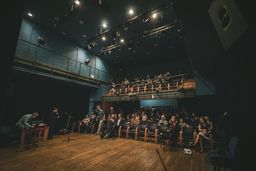 Discussion about visual anthropology in Czech and Slovak republic. Guests are Zuzana Beňušková, Tomáš Hirt, Tomáš Petráň, Michal Pavlásek, Pavel Borecký a Milan Durňak and Lívia Šavelková.
Discussion about visual anthropology in Czech and Slovak republic. Guests are Zuzana Beňušková, Tomáš Hirt, Tomáš Petráň, Michal Pavlásek, Pavel Borecký a Milan Durňak and Lívia Šavelková.
Francie, 2017, 96 min
Séverine Enjolras, Magali Bragard
04.03.2020 15:00
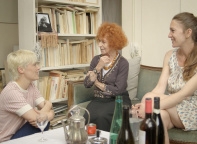 During a summer in Paris and its suburbs, two young directors attempt a remake of "Chroniques d'un été", fifty years after the cult film of Rouch and Morin. An offbeat portrait of nowday's youth, as a mirror image of the 1960s, while questions of the "cinéma vérité" are revisited with fancy.
During a summer in Paris and its suburbs, two young directors attempt a remake of "Chroniques d'un été", fifty years after the cult film of Rouch and Morin. An offbeat portrait of nowday's youth, as a mirror image of the 1960s, while questions of the "cinéma vérité" are revisited with fancy.
Séverine Enjolras and Magali Bragard are both holders of a DEA in visual anthropology obtained in 2003 in Paris 10 - Nanterre, under the direction of Jean Rouch. In 2009 they co-directed a short documentary film, "Dombes", on the study and management of a health risk. They are both teachers in documentary cinema, they created and organized in 2007 and 2008 a festival of films in the West Bank. Séverine Enjolras has also directed several documentaries, institutional films and films around citizen consultation workshops. Magali Bragard, in addition to his work of realization, is also a stage and press photographer.
Director, camera, script: Séverine Enjorlas, Magali Bragard
Production: Survivance
Edit: Magali Bragard, Thomas Laufer
Language of dialogues: French
Language of subtitles: English
Award of Excellence in Visual Anthropology, Ethnocineca, Vienna, Austria
Trailer: https://vimeo.com/237268706
Velká Británie, 2011, 28 min
Kieran Hanson
03.03.2020 11:30
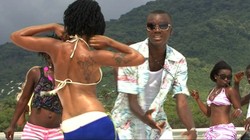 A decade since Sierra Leone's devastating civil war, from the ashes rises a new dawn of creativity in audio-visual media. Inspired by Jean Rouch's ‘shared anthropology’ and ‘ethno-fiction’, Shooting Freetown follows three people forging their way in film and music in the nation's capital, facing the constant struggles with vision and resourcefulness. By incorporating collaborative video projects, their stories give a fresh image of post-war Freetown - presented to the world through their own lens.
A decade since Sierra Leone's devastating civil war, from the ashes rises a new dawn of creativity in audio-visual media. Inspired by Jean Rouch's ‘shared anthropology’ and ‘ethno-fiction’, Shooting Freetown follows three people forging their way in film and music in the nation's capital, facing the constant struggles with vision and resourcefulness. By incorporating collaborative video projects, their stories give a fresh image of post-war Freetown - presented to the world through their own lens.
Kieran studied visual anthropology (ethnographic film) MA at Manchester University, carrying out his fieldwork in Freetown, Sierra Leone.
Director:Kieran Hanson
Production: Granada centre for Visual Anthropology, University of Manchester
Language of dialogues: English, Krio Language
Language of subtitles: English, Czech
Estonsko, 2016, 78 min
Liivo Niglas
04.03.2020 19:00
"The Land of Love" is a documentary film about reindeer, oil, politics and poetry. It tells a story about Yuri Vella, a Forest Nenets reindeer herder and poet who lives in the taiga of Western Siberia, and who tries to prove that one person can stand against the great power that is destroying the environment of the native people. Vella calls the "Land of Love" a piece of the forest tundra where each autumn his reindeer mate. The same area is a favoured hunting ground for employees of Lukoil, a company that pumps oil in the region. For many years already Yuri has tried to chase the Lukoil people away from the "Land of Love" because the noise of cars and rifle shots and the ruckus caused by boozing oil workers disturbs the mating of reindeer. Yuri uses several unusual resistance methods to chase the oil workers away, including filming the intruders and writing poems on the subject.
Liivo Niglas is currently a research fellow at the department of ethnology in University of Tartu, Estonia. He runs an independent production company, Mp Doc, for anthropological documentary films. He has made films in Siberia, Africa, Central Asia and North America. Some of his works are: The Brigade (2000), Yuri Vella's World (2003), Adventure High (2004), Making Rain (2007), Fish On! (2008), Itelmen Stories (2010), Journey to the Maggot Feeder (2015).
Director, Camera, Script, Edit: Liivo Niglas
Production: F-Seitse & MP DOC
Language of dialogues: Russian, Khanty, Forest Nenets, French
Langue of subtitles: Czech, English
Launching of the movie, awards:
The National Estonian Film and Television Award for the best documentary 2016; Annual Award of the Estonian Cultural Endowment for the best documentary 2016; 1st Prize (Man and Nature), Matsalu Nature Film Festival, Estonia
Trailer: https://www.youtube.com/watch?v=Aq6JYJysHWc
Česká republika, 2019, 5 min
A. Bláhová, P. Jiskra, R. Tvrdá
03.03.2020 14:30
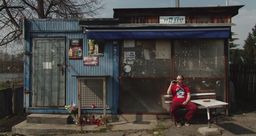 Režie, kamera, scénář, střih, prodkce: A. Bláhová, P. Jiskra, R. Tvrdá (ZČU)
Režie, kamera, scénář, střih, prodkce: A. Bláhová, P. Jiskra, R. Tvrdá (ZČU)
Česká republika, 2019, 25 min
Lucie Knytlová
03.03.2020 15:00
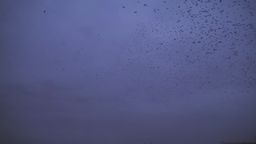 Režie, kamera: Lucie Knytlová (UPa)
Režie, kamera: Lucie Knytlová (UPa)
Střih, produkce: Lucie Knytlová, Milan Durňak
Česká republika, 2009, 38 min
Jaroslava Panáková
04.03.2020 10:00
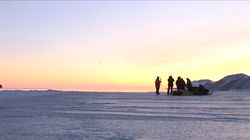 In the far, far North, where the day begins and the oceans meet, a small hamlet New Chaplino is situated. The goverment decided to turn the village into a tourist resort. It is winter, 30 degrees Celsius below zero. The tourists are not coming. There are only few memories of them and the snow has already covered their footprints. The village people live in the cardoard houses. They are waiting for the tourists and dancing. It is only Vika, their country fellow, who is coming to visit her native village after she has spent few years in the city. Thus all villagers keep waiting for the tourists and dancing...
In the far, far North, where the day begins and the oceans meet, a small hamlet New Chaplino is situated. The goverment decided to turn the village into a tourist resort. It is winter, 30 degrees Celsius below zero. The tourists are not coming. There are only few memories of them and the snow has already covered their footprints. The village people live in the cardoard houses. They are waiting for the tourists and dancing. It is only Vika, their country fellow, who is coming to visit her native village after she has spent few years in the city. Thus all villagers keep waiting for the tourists and dancing...
Director: Jaroslava Panáková
The Director Jaroslava Panáková was born in Martin, Slovakia. She graduated in social anthropology at St.Peterburg State University, Russia and in documentary cinema at FAMU, Prague, Czech republic. She is currently working at the research institute in Halle/Saale, Germany.
Production: Pavla Kubečková Company, FAMU
Camera: Georgij Bagdasarov
Edit: Libor Alexa
Award: Tococu Lisabon 2010
Language of dialoques: Rusiain, Chukchi
Language of subtitles: Czech, English
Ghana, Nizozemí, 2016, 36 min
Mara Lin Visser
04.03.2020 17:45
 Unity: Dress-scapes of Accra is an ethnographic film about African fashion in the capital of Ghana. The comeback of African print seems to be emerging in the fashion system of Accra. While following Allan, a fashion designer and his wife Cynthia, this mosaic film shows the great diversity of tailor-made fashion and hybrid styles; the ways the African wear is used and the expression of culture by wearing the African prints. The film highlights beautiful details by focusing on a few participants who show the mixture of different materials, cuts and styles in a creative and free atmosphere. In this way the film is not only observational, it gives people space to tell their story and show they are proud of the African wear.
Unity: Dress-scapes of Accra is an ethnographic film about African fashion in the capital of Ghana. The comeback of African print seems to be emerging in the fashion system of Accra. While following Allan, a fashion designer and his wife Cynthia, this mosaic film shows the great diversity of tailor-made fashion and hybrid styles; the ways the African wear is used and the expression of culture by wearing the African prints. The film highlights beautiful details by focusing on a few participants who show the mixture of different materials, cuts and styles in a creative and free atmosphere. In this way the film is not only observational, it gives people space to tell their story and show they are proud of the African wear.
Mara Lin Visser is a visual anthropologist and filmmaker based in Amsterdam. She discovered filmmaking during the production of documentary on material culture in Volendam for her MA Visual Anthropology. The medium of film gives her the freedom to express herself, her thoughts about certain topics and academic observations in a natural way. For her film is the perfect way to explore the broad subject of material culture. With this in mind she decided to do her fieldwork in Ghana, which resulted in the film 'Unity: Dress-scapes of Accra'. She is interested in queer rights, participation society, material culture, fashion, geopolitics and art.
Director, Camera, production, Edit, Script: Mara Lin Visser
Language of Dialogues: English, languages Ga and Twi
Language of Subtitles: Czech, English
Launching of the movie (selection):
RAI Film festival in Bristol, Great Britain; Ethnografilm, Paris, France; Ethnocineca Vienna, Austria; Kratovo Ethnographic film Festival in Macedonia; Society for Visual Anthropology Film and Media Festival (SVAFMF); Taiwan International Ethnographic Film Festival
Trailer: https://vimeo.com/205078498
Belgie, 2016, 61 min
David Bert Joris Dhert
03.03.2020 13:00
 What roads did the 2014 FIFA World Cup and the 2016 Rio Olympic Games pave for Brazil? Along three years of navigating through the daily lives of three Brazilians, one indigenous, one African and one European descendant, the documentary We must be dreaming explores what the World Cup and the Olympic Games have brought to the lives of the people of Rio de Janeiro and to what degree the biggest sport events of the planet have brought the dreams and opportunities they promise.
What roads did the 2014 FIFA World Cup and the 2016 Rio Olympic Games pave for Brazil? Along three years of navigating through the daily lives of three Brazilians, one indigenous, one African and one European descendant, the documentary We must be dreaming explores what the World Cup and the Olympic Games have brought to the lives of the people of Rio de Janeiro and to what degree the biggest sport events of the planet have brought the dreams and opportunities they promise.
David Bert Joris Dhert is a Belgian documentary filmmaker working in the field of visual anthropology. Since 2010 he lives between Belgium and Brazil, where he has realized a film about the changes the 2014 FIFA World Cup and the 2016 Olympic Games brought to the lives of his Rio co-citizens. His work has been invited for documentary film festivals, ethnographic film festivals as well as for exhibitions for contemporary art.
Director, Camera, Script, Edit: David Bert Joris Dhert
Production: Gregg Young
Language of Dialogues: Portuguese
Language of Subtitles: Czech, English
Launching of the movie (selection):
Society for Visual Anthropology Film and Media Festival, Washington DC, US; Athens Ethnographic Film Festival Greece; Viscult international documentary and ethnographic film festival, Finland; IVSA 2017 international conference for visual sociology, Montréal, Canada
Trailer: https://www.youtube.com/watch?v=IrxkzHJD44U
Česká republika, 2020, 30 min
M.Pavlásek
03.03.2020 16:00
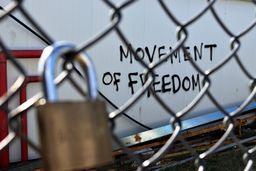 The exhibition of photographs of Michal Pavlásek.
The exhibition of photographs of Michal Pavlásek.
Slovensko, 2016, 50 min
Soňa Lutherová
04.03.2020 10:40
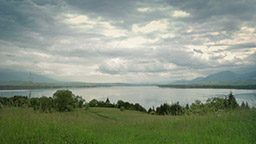 Zatopené (Flooded) is an anthropological documentary film about a building and the fates connected to it. The mansion in Parizovce was a family residence, home, property, center of a farmstead and eventually a historical monument. Some parts of the building have been preserved and have endured through centuries, others have been flooded by the waters of the Liptovska Mara waterworks. For the descendants of the Stein family, its last owners, the mansion is a memory of a lost past. For museum curators it's a gem, a phoenix risen from the muddy waters, the pride of the Liptov region. An unusual story of the mansion from Parizovce and its last owners, that is also a reflection of the social changes in 20th century Slovakia.
Zatopené (Flooded) is an anthropological documentary film about a building and the fates connected to it. The mansion in Parizovce was a family residence, home, property, center of a farmstead and eventually a historical monument. Some parts of the building have been preserved and have endured through centuries, others have been flooded by the waters of the Liptovska Mara waterworks. For the descendants of the Stein family, its last owners, the mansion is a memory of a lost past. For museum curators it's a gem, a phoenix risen from the muddy waters, the pride of the Liptov region. An unusual story of the mansion from Parizovce and its last owners, that is also a reflection of the social changes in 20th century Slovakia.
Soňa G. Lutherová is a social and visual anthropologist. As a researcher at the Institute of Ethnology of the Slovak Academy of Sciences, she examines the changing identities of people in post-socialism, especially in relation to their material environment. She has lectured, researched and studied at universities in Slovakia, Czech Republic, Sweden and Austria. She is a co-author of several short documentary films and an author of visual art projects. Flooded is her screenwriting and directorial debut.
Director: Soňa G. Lutherová
Production: Barbara Harumová Hessová
Camera: Denisa Buranová
Edit: Peter Harum
Language of Dialogues: Slovak
Language of Subtitles: English

 The film situates the viewer within the makeshift space of an animal market in Algeria. Drifting between feeding and waiting, one attunes to the bodies of goats and camels, the oldest companions of Arab men. As we move deeper into the desert, the site turns into a sacrifice zone and reveals its dark geopolitical secrets. The sensory ethnography film will invite you to question the banality of displacement, confinement and exploitation in an out-of-sight territory.
The film situates the viewer within the makeshift space of an animal market in Algeria. Drifting between feeding and waiting, one attunes to the bodies of goats and camels, the oldest companions of Arab men. As we move deeper into the desert, the site turns into a sacrifice zone and reveals its dark geopolitical secrets. The sensory ethnography film will invite you to question the banality of displacement, confinement and exploitation in an out-of-sight territory. The filmmakers follow various alternative forms of socail thought, based on cooperation, openness and direct exchange of experience. They encounter on the various initiatives that seek to restore the dynamic exchange of people and culture. Dialoque with representatives and activists such as: open source trends, Permaculture, Qi gong, „Art exchange“, „Food not bombs“, presents a new from of „gift“ meaning.
The filmmakers follow various alternative forms of socail thought, based on cooperation, openness and direct exchange of experience. They encounter on the various initiatives that seek to restore the dynamic exchange of people and culture. Dialoque with representatives and activists such as: open source trends, Permaculture, Qi gong, „Art exchange“, „Food not bombs“, presents a new from of „gift“ meaning. Režie, kamera, scénář, střih: Adi Hasanbašić
Režie, kamera, scénář, střih: Adi Hasanbašić The mass is a distillation of human evolution, a parable about the treatment of substance, an image of the control over bodies that are hanged on the world’s tissue, or else disgorged from the ocean mass onto dry land, which is interwoven with bodies and the movement of hunters, gatherers, and vagabonds. Our observation of the various forms of abstracted masses, which we become part of at the same time, creates a platform of eternal presence – an active void if you will, which revolves in a closed circle, as though it had neither beginning nor end. What is left is just the stark presence of the traces of bared lives.
The mass is a distillation of human evolution, a parable about the treatment of substance, an image of the control over bodies that are hanged on the world’s tissue, or else disgorged from the ocean mass onto dry land, which is interwoven with bodies and the movement of hunters, gatherers, and vagabonds. Our observation of the various forms of abstracted masses, which we become part of at the same time, creates a platform of eternal presence – an active void if you will, which revolves in a closed circle, as though it had neither beginning nor end. What is left is just the stark presence of the traces of bared lives. Discussion about visual anthropology in Czech and Slovak republic. Guests are Zuzana Beňušková, Tomáš Hirt, Tomáš Petráň, Michal Pavlásek, Pavel Borecký a Milan Durňak and Lívia Šavelková.
Discussion about visual anthropology in Czech and Slovak republic. Guests are Zuzana Beňušková, Tomáš Hirt, Tomáš Petráň, Michal Pavlásek, Pavel Borecký a Milan Durňak and Lívia Šavelková. During a summer in Paris and its suburbs, two young directors attempt a remake of "Chroniques d'un été", fifty years after the cult film of Rouch and Morin. An offbeat portrait of nowday's youth, as a mirror image of the 1960s, while questions of the "cinéma vérité" are revisited with fancy.
During a summer in Paris and its suburbs, two young directors attempt a remake of "Chroniques d'un été", fifty years after the cult film of Rouch and Morin. An offbeat portrait of nowday's youth, as a mirror image of the 1960s, while questions of the "cinéma vérité" are revisited with fancy. A decade since Sierra Leone's devastating civil war, from the ashes rises a new dawn of creativity in audio-visual media. Inspired by Jean Rouch's ‘shared anthropology’ and ‘ethno-fiction’, Shooting Freetown follows three people forging their way in film and music in the nation's capital, facing the constant struggles with vision and resourcefulness. By incorporating collaborative video projects, their stories give a fresh image of post-war Freetown - presented to the world through their own lens.
A decade since Sierra Leone's devastating civil war, from the ashes rises a new dawn of creativity in audio-visual media. Inspired by Jean Rouch's ‘shared anthropology’ and ‘ethno-fiction’, Shooting Freetown follows three people forging their way in film and music in the nation's capital, facing the constant struggles with vision and resourcefulness. By incorporating collaborative video projects, their stories give a fresh image of post-war Freetown - presented to the world through their own lens. Režie, kamera, scénář, střih, prodkce: A. Bláhová, P. Jiskra, R. Tvrdá (ZČU)
Režie, kamera, scénář, střih, prodkce: A. Bláhová, P. Jiskra, R. Tvrdá (ZČU) Režie, kamera: Lucie Knytlová (UPa)
Režie, kamera: Lucie Knytlová (UPa) In the far, far North, where the day begins and the oceans meet, a small hamlet New Chaplino is situated. The goverment decided to turn the village into a tourist resort. It is winter, 30 degrees Celsius below zero. The tourists are not coming. There are only few memories of them and the snow has already covered their footprints. The village people live in the cardoard houses. They are waiting for the tourists and dancing. It is only Vika, their country fellow, who is coming to visit her native village after she has spent few years in the city. Thus all villagers keep waiting for the tourists and dancing...
In the far, far North, where the day begins and the oceans meet, a small hamlet New Chaplino is situated. The goverment decided to turn the village into a tourist resort. It is winter, 30 degrees Celsius below zero. The tourists are not coming. There are only few memories of them and the snow has already covered their footprints. The village people live in the cardoard houses. They are waiting for the tourists and dancing. It is only Vika, their country fellow, who is coming to visit her native village after she has spent few years in the city. Thus all villagers keep waiting for the tourists and dancing... Unity: Dress-scapes of Accra is an ethnographic film about African fashion in the capital of Ghana. The comeback of African print seems to be emerging in the fashion system of Accra. While following Allan, a fashion designer and his wife Cynthia, this mosaic film shows the great diversity of tailor-made fashion and hybrid styles; the ways the African wear is used and the expression of culture by wearing the African prints. The film highlights beautiful details by focusing on a few participants who show the mixture of different materials, cuts and styles in a creative and free atmosphere. In this way the film is not only observational, it gives people space to tell their story and show they are proud of the African wear.
Unity: Dress-scapes of Accra is an ethnographic film about African fashion in the capital of Ghana. The comeback of African print seems to be emerging in the fashion system of Accra. While following Allan, a fashion designer and his wife Cynthia, this mosaic film shows the great diversity of tailor-made fashion and hybrid styles; the ways the African wear is used and the expression of culture by wearing the African prints. The film highlights beautiful details by focusing on a few participants who show the mixture of different materials, cuts and styles in a creative and free atmosphere. In this way the film is not only observational, it gives people space to tell their story and show they are proud of the African wear.  What roads did the 2014 FIFA World Cup and the 2016 Rio Olympic Games pave for Brazil? Along three years of navigating through the daily lives of three Brazilians, one indigenous, one African and one European descendant, the documentary We must be dreaming explores what the World Cup and the Olympic Games have brought to the lives of the people of Rio de Janeiro and to what degree the biggest sport events of the planet have brought the dreams and opportunities they promise.
What roads did the 2014 FIFA World Cup and the 2016 Rio Olympic Games pave for Brazil? Along three years of navigating through the daily lives of three Brazilians, one indigenous, one African and one European descendant, the documentary We must be dreaming explores what the World Cup and the Olympic Games have brought to the lives of the people of Rio de Janeiro and to what degree the biggest sport events of the planet have brought the dreams and opportunities they promise. The exhibition of photographs of Michal Pavlásek.
The exhibition of photographs of Michal Pavlásek. Zatopené (Flooded) is an anthropological documentary film about a building and the fates connected to it. The mansion in Parizovce was a family residence, home, property, center of a farmstead and eventually a historical monument. Some parts of the building have been preserved and have endured through centuries, others have been flooded by the waters of the Liptovska Mara waterworks. For the descendants of the Stein family, its last owners, the mansion is a memory of a lost past. For museum curators it's a gem, a phoenix risen from the muddy waters, the pride of the Liptov region. An unusual story of the mansion from Parizovce and its last owners, that is also a reflection of the social changes in 20th century Slovakia.
Zatopené (Flooded) is an anthropological documentary film about a building and the fates connected to it. The mansion in Parizovce was a family residence, home, property, center of a farmstead and eventually a historical monument. Some parts of the building have been preserved and have endured through centuries, others have been flooded by the waters of the Liptovska Mara waterworks. For the descendants of the Stein family, its last owners, the mansion is a memory of a lost past. For museum curators it's a gem, a phoenix risen from the muddy waters, the pride of the Liptov region. An unusual story of the mansion from Parizovce and its last owners, that is also a reflection of the social changes in 20th century Slovakia.